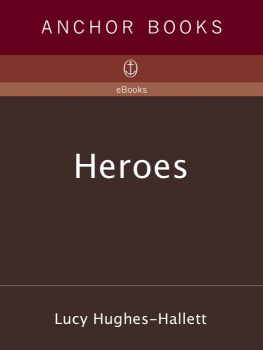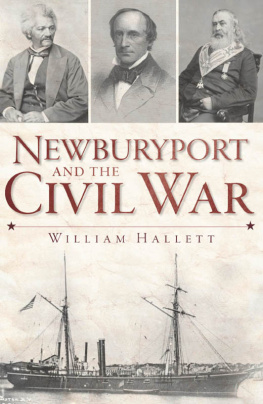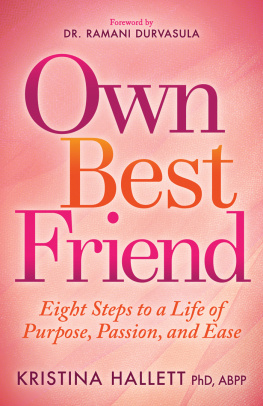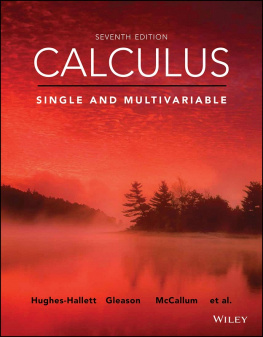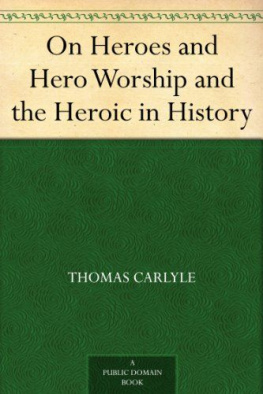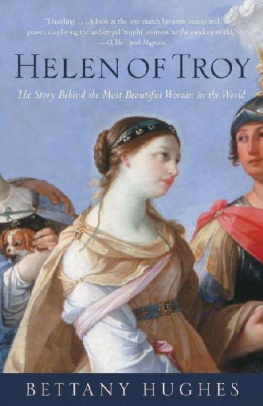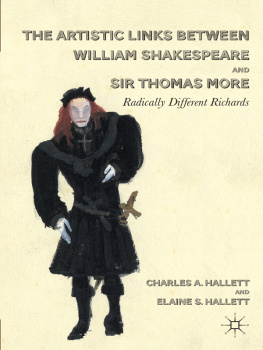Acclaim for Lucy Hughes-Halletts
HEROES
A book packed with information and insights. [A] formidable accomplishment.
Washington City Paper
Magnificent. Cleverly argued. A fascinating portrait gallery.
The Sunday Telegraph (London)
I greatly enjoyed and admired Heroes. I intended when I opened it to take a few soundings here and there rather than read it seriously. But the plan failed; I had to read every word. What terrific and terrible stories they all are. Lucy Hughes-Hallett knows so much, and writes so elegantly. A wonderful book.
Michael Frayn
Fascinating. Compellingly portraying her heroes, Hughes-Hallett is equally brilliant in evoking both the allure and the danger of hero worship.
Publishers Weekly (starred review)
Brilliantly explored. Both rich in material, and riveting to read.
The Sunday Times (London)
Compendious and stupendous. Will leave you flushed and breathless.
The Independent on Sunday
A magnificent book. Lucy Hughes-Halletts prose, never flawed, is worthy of the grand scope of her subject. It would be possible to read Heroes for the style alone, which has about it the effortlessly seductive quality of those men she is writing about.
Literary Review
Vivid and highly readable, here are biographies that thrill, enthrall, and dazzle.
The Observer (London)

LUCY HUGHES-HALLETT
HEROES
Lucy Hughes-Hallett is a critic for The Sunday Times (London) and the author of Cleopatra: Histories, Dreams, and Distortions. She lives in London with her husband and daughters and is at work on a book about Gabriele dAnnunzio and the origins of Italian fascism.
ALSO BY LUCY HUGHES-HALLETT
Cleopatra: Histories, Dreams, and Distortions
For Dan
CONTENTS
I:
II:
III:
IV:
V:
VI:
VII:
VIII:
PROLOGUE
Rage! The first word of the Iliad, the word that inaugurates Europes literary culture and introduces one of its dominant themes. The rage not of Agamemnon, king and commander, but of Achilles, the semidivine delinquent, the paradigmatic hero whose terrible choice of glory at the price of an early death has haunted the collective imagination of the West for two and a half millennia.
Heroes are dynamic, seductive peoplethey wouldnt be heroes otherwiseand heroic rage is thrilling to contemplate. It is the expression of a superb spirit. It is associated with courage and integrity and a disdain for the cramping compromises by means of which the unheroic majority manage their livesattributes which are widely considered noble. It is also profoundly disruptive of any civil state. Homers Achilles was the the best of the Achaeans, the preeminent Greek warrior, but his rage was directed against Agamemnon, leader of the Greeks. The Iliad is a celebration of Achilles lethal glamour; it is also the story of how he came close to occasioning the defeat of the community of which he was the most brilliant representative.
This book is about Achilles and some of his real-life successors (whether Homers hero really lived we are unlikely ever to know for certain). It takes the form of a series of brief lives of people who have been considered by their contemporaries to be so exceptionally gifted as to be capable of something momentousthe defeat of an enemy, the salvation of a race, the preservation of a political system, the completion of a voyagewhich no one else could have accomplished. In 411 BC the people of Athens resolved to recall Alcibiades, whom they had once condemned to death and who had subsequently fought with devastating success for their opponents, because, as one of their commanders told the Assembly, he was the only person living who could save their state. So the eleventh century King Alfonso VI of Castile turned to Rodrigo Daz de Vivar, known as the Cida man he had twice banishedwhen African invaders poured into Spain, because whatever threat the Cid posed to the stability of the kingdom he was known to have been born in a lucky hour and could therefore never be defeated. And so in 1630 the Holy Roman Emperor Ferdinand II, having first nerved himself to dismiss his overweening and intransigent general, Albrecht von Wallenstein, had then to humble himself by imploring Wallenstein to resume his command and save the empire from the onslaught of the invading Swedes, something that, by common consent of all his enemies (he had few friends), Wallenstein alone could hope to do.
Cometh the hour, cometh the man. It is in times of emergency that heroes are looked for, and found. Bertolt Brecht wrote, famously, that it is an unhappy land that looks for heroes. The dictum is ambiguous, and works both ways. A land without heroes may be fortunate in their absence, for a hero is a menace to any states equilibrium. The Argonauts left Heracles behind, noted Aristotle, for the same reason that the Athenians took to ostracizing and sending into exile outstanding citizens, so the Argos would not have on board one so vastly bigger than the rest of the crew. But only a fortunate land is confident enough to dispense with heroes. Now it is fashionable to lament the littleness of those accorded celebrity within our cultureso many football players and rock stars and models, so few great spiritsbut such collective frivolity should be cherished as one of the privileges of peace. It is desperation that prompts people to crave a champion, a protector, or a redeemer and, having identified one, to offer him their worship.
Virtue is not a necessary qualification for heroic status: a hero is not a role model. On the contrary, it is of the essence of a hero to be unique and therefore inimitable. Some of the people whose stories are told in this book were irreproachable, others were scoundrels. Cato had the highest moral standards and adhered to them as nearly always as could possibly be expected. Garibaldi was a man of signal sincerity. (Although he was not quite so transparently simple as his admirers imagined. Alfred, Lord Tennyson, meeting him in 1864, was delighted to recognize in him the divine stupidity of a hero. In fact Garibaldi was far from dumb: he just didnt speak English.) But Alcibiades was an arrogant libertine and a turncoat several times over. The Cid was a predatory warlord, Drake was a pirate and a terrorist, and Wallenstein was a profiteer prone to apparently psychotic rages whose contemporaries believed him to be in league with the devil. But heroes are not required to be altruistic, or honest, or even competent. They are required only to inspire confidence and to appear, not good necessarily, but great.
This book is rooted in ambivalence. Thomas Carlyle, who wrote one on the same subject and with the same structure a century and half ago, declared that there was no nobler feeling than hero worship. Heartfelt prostrate admiration, submission, burning, boundless, for a noblest godlike Form of Man it is to this hour and at all hours the vivifying influence in a mans life. I disagree. An exaggerated veneration for an exceptional individual poses an insidious temptation. It allows worshipers to abnegate responsibility, looking to the great man for salvation or for fulfillment which they should more properly be working to accomplish for themselves. Carlyle approvingly called it the germ of all religion hitherto known, but to make a fellow human the object of religious devotion is unwise. Hero worshipers, as the stories in this book repeatedly demonstrate, are frequently disappointed in, and lay themselves open to abuse by, the heroes of their choice.

